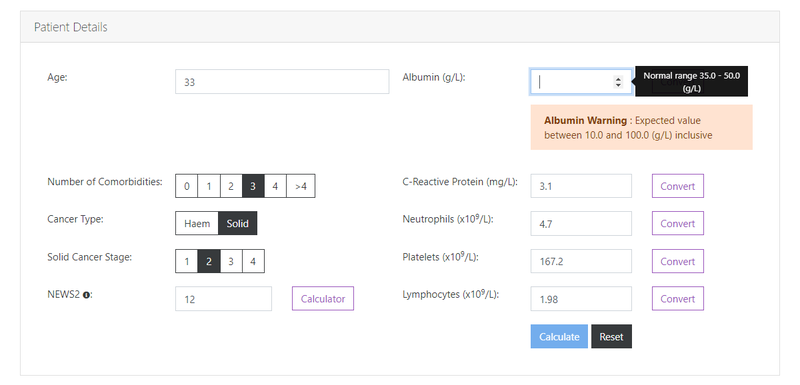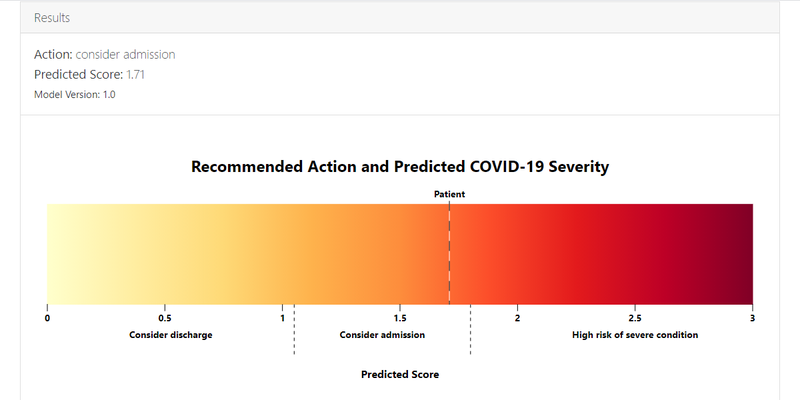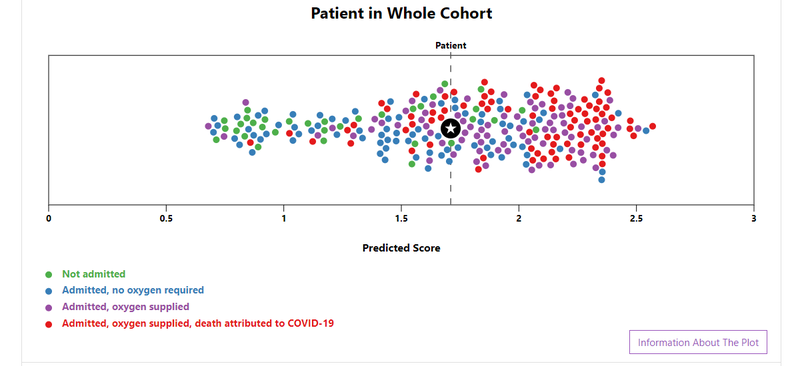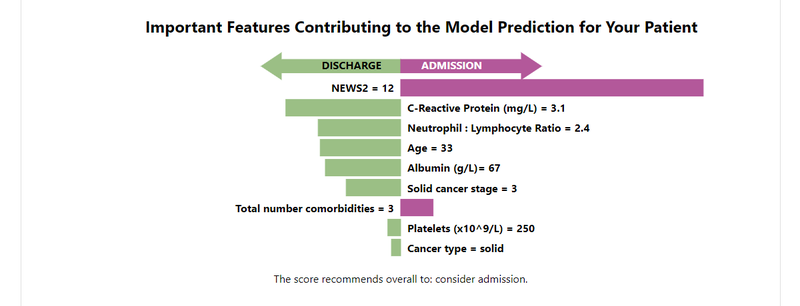Research IT has been working with the Digital Experimental Cancer Medicine Team (dECMT) based within the Cancer Research UK (CRUK) Manchester Institute to expand their work on creating a tool to support decisions regarding hospital admissions or discharge in cancer patients presenting with symptoms of COVID-19 and the likely severity of illness.
They came to us with a version of the tool that could be run programmatically, but required set-up and specialist knowledge. Their tool provided a predicted score in the range [0,3], placing the patient into one of three suggested actions: 1) Consider Discharge, 2) Consider Admission or 3) High Risk of Severe Condition. Several plots are presented to provide context and help explain the given score.
The goal was to create an online version of the tool that would take validated inputs required to run the model, and then display a predicted score with a suggested course of action. Alongside the results would be web versions of the three plots that would help patients and clinicians to:
- Visualize the score.
- Compare their score with the patient cohort data used to train the model.
- Display how each input was weighted and its contribution to the predicted score and outcome.
Development
Louise Lever and Josh Woodcock, two of our Research Software Engineers (RSEs), used the flexibility afforded by our customised web platform, built on Django and the Wagtail content management system, with some additional bespoke visualizations utilising JavaScript, D3.js and SVG to create a tool..
With the difficulty facing care providers. the patients already fighting cancer and the growing onset of the COVID pandemic, it was imperative that development and release was met as urgently as possible. Josh and Louise worked closely with the dECMT team to rapidly and iteratively develop the tool so that it could be delivered as soon as possible.
Figure below shows the form with some example data entered, alongside feedback of expected range and warnings.

The development focussed on multiple areas: creating and streamlining the input form for the required fields; providing both hard constraints, validation and ranges expected by the decision tool; running of the model decision tool on a server; generating multiple plots, choosing appropriate visualization idioms, selecting accessible colour schemes; and of course the inevitable small tweaks such as fixing spelling, grammar, wording etc.
Figure below shows diagnostic tool result with score, outcome and a simple visualization of that score's position on a scale:

Figure below shows result in context of patient cohort that the model was trained on. This also includes colour based categorisation of the outcome for the patient upon admittance.

Figure below shows details of contributing factors towards score and the suggested diagnosis, sorted correspondingly with their weight towards the decision:

Launch and Future Iterations
The site was launched with a small online party with the team and supporting clinicians on December 4th 2020. Further development is expected to tweak, enhance and extend the functionality of the tool in the coming months.
The site was developed using Django (a Python based web framework), Wagtail CMS (a content management system built on Django) with custom functionality added by Research IT. We've developed multiple websites over the last few years and we will be launching that as a specific Web Application Development Service in due course.
While we have a web framework with a content management system, our goal is not to provide basic websites for researchers - who should continue to use all existing services offered at the University - but instead deliver web applications that have a bespoke requirement e.g., interactive map of stories, COVID/Cancer diagnostic tool with visualization.
If you'd like to discuss possible future collaborations including the development of a bespoke web application please contact Louise Lever or Joshua Woodcock.

